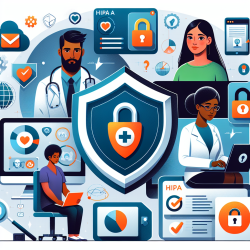Introduction
In the realm of online therapy services, especially for children, maintaining privacy and confidentiality is paramount. The research article "Privacy and Confidentiality in Emergency Medicine: Obligations and Challenges" provides valuable insights that can be leveraged to enhance the skills of practitioners in safeguarding sensitive information. This blog will explore the key findings of the study and offer practical advice for implementing these insights in online therapy settings.
Understanding Privacy and Confidentiality
Privacy and confidentiality are foundational principles in healthcare, with roots in the Hippocratic Oath and modern ethical codes. Privacy encompasses physical seclusion and informational privacy, while confidentiality pertains to the protection of personal information. For online therapy practitioners, understanding these concepts is crucial to building trust with clients and ensuring their well-being.
Key Challenges in Maintaining Privacy and Confidentiality
The research highlights several challenges faced by emergency medicine practitioners, which are equally relevant in online therapy:
- Space Constraints: In emergency settings, limited space can compromise privacy. Similarly, online therapy platforms must ensure secure digital spaces to protect client information.
- Observers and Visitors: While educational observation is valuable, it must be balanced with privacy concerns. Online therapy practitioners should establish clear guidelines for any third-party involvement.
- Communication: Effective communication is essential, but it must not breach confidentiality. Practitioners should use secure channels and obtain consent before sharing information.
Implementing Best Practices
To enhance privacy and confidentiality in online therapy, practitioners can adopt the following strategies:
- Use Secure Platforms: Choose platforms that comply with HIPAA regulations and offer encryption to protect client data.
- Educate Clients: Inform clients about their privacy rights and the measures in place to protect their information.
- Regular Training: Engage in ongoing training to stay updated on privacy laws and best practices.
- Consent Management: Implement robust consent management systems to ensure clients are aware of and agree to data sharing practices.
Encouraging Further Research
While the research provides a solid foundation, continuous learning and adaptation are necessary. Practitioners are encouraged to delve deeper into privacy and confidentiality issues, particularly as they pertain to online therapy for children. Exploring emerging technologies and their implications on privacy will be crucial in providing secure and effective therapy services.
To read the original research paper, please follow this link: Privacy and Confidentiality in Emergency Medicine: Obligations and Challenges.










